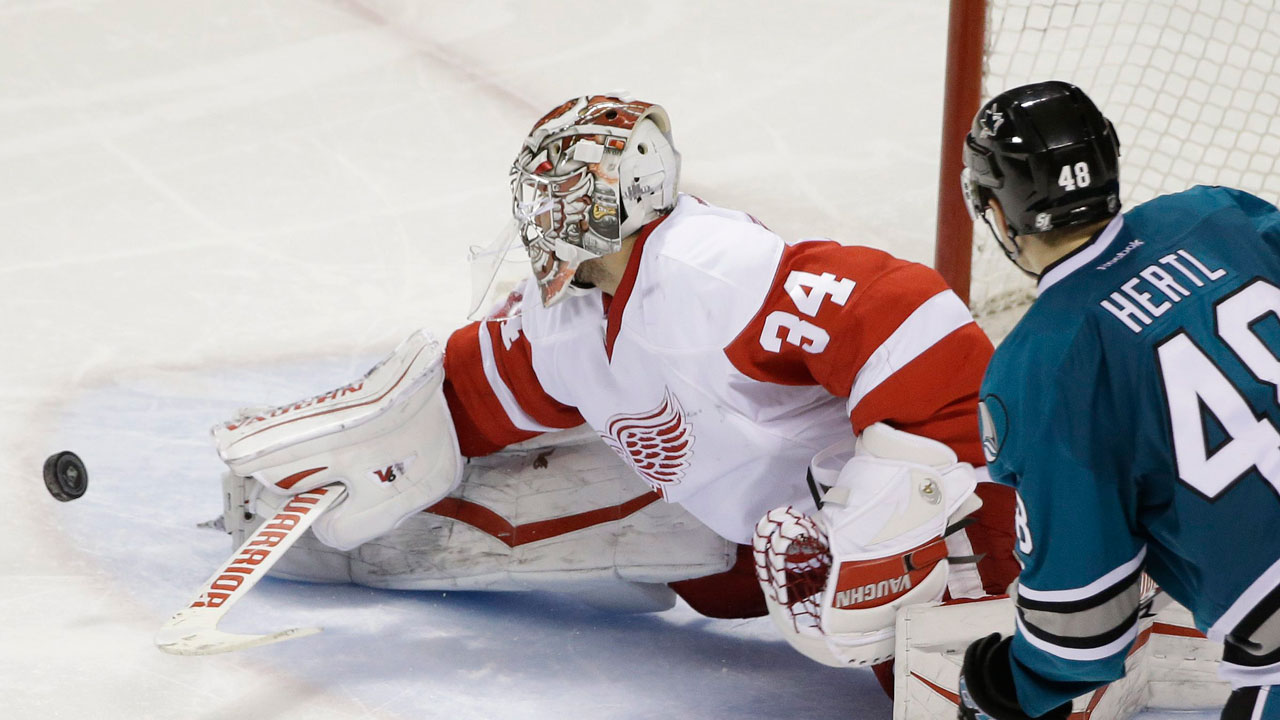Here is the question one of the NHL’s most storied franchises isn’t really grappling with right now–but definitely should be: What is an eighth seed in the playoffs worth this season?
And what will it cost your team in the long run?
In the Eastern Conference, the Washington Capitals have been laying holy waste to the competition basically all year. They are a team with few weaknesses–a Vezina-calibre goalie in Braden Holtby, a rock-solid-if-not-flashy defence and an offence led by perhaps the best trio of elite forwards in the NHL. Oh, and they have a pretty good coach now, too.
As anyone who watches or reports on hockey will tell you, all you really need to have a chance at a Cup is a spot in the playoffs–but still, the Caps are the overwhelming favourite to come out of the east. Their first-round opponent will be seen–and rightly so–as a team that needs to play its heart out and still get lucky to even have a shot.
The Detroit Red Wings, Philadelphia Flyers and Boston Bruins are battling for the honour of being that club. This is a dubious honour, but the Red Wings in particular seem to think it necessitates something of a tearing up of a blueprint that was, if not working to perfection, than at least building towards tangible results.
The Wings, owners of North American sports’ longest playoff streak, watched their all-world coach say goodbye last off-season. The players on whose backs the latter part of that streak–including the fourth Stanley Cup won during it, in 2008–was built, turned 37, 35 and 35, respectively. Even the arena where those glorious moments occurred is on its last legs. It was time for a turning of the page, and the Wings even had just the coach to do it–Jeff Blashill, the guy who’d led the Grand Rapids Griffins and Detroit’s young prospects, and there are plenty, to a Calder Cup in the AHL.
So the transition was ready and waiting, and in the early part of this season, it appeared to work to perfection. Dylan Larkin was a revelation as a 19-year-old rookie, and drew comparisons to a young Jonathan Toews.
Petr Mrazek grabbed the starting goaltender job by the throat and appeared to relegate Jimmy Howard to permanent backup duty.
The lineup was littered with standout prospects who were finally being given a chance to prove they belonged, from Teemu Pulkkinen‘s cannon of a shot, to Tomas Jurco‘s quick hands, Alexey Marchenko’s physical presence and still there was continued development of younger NHLers like Tomas Tatar, Riley Sheahan, Gustav Nyquist and Brendan Smith.
Sure some of them struggled at times, and made mistakes that ex-coach Mike Babcock would have blanched to see, but this was the future of the Red Wings, fronted by the playing-less-and-teaching-more duo of Henrik Zetterberg and Pavel Datsyuk, but ultimately living and dying with their kids. That was the plan, anyway. Think of it as a more ready-for-prime-time version of the play-the-kids strategy that the Maple Leafs have employed these past few weeks.
Then, of course, adversity reared its head, as it always will during a middle-of-the-pack season. And rather than push on through it, losses be damned, the way the Leafs have done–because how else do you expect young players to learn?—the organization that has gone more than two decades without a true failure of a season panicked as though ending that playoff streak was to be equated with a massive rebuilding effort. The Red Wings, it seemed, don’t see themselves as a team that misses the playoffs, and even less as a team that rebuilds.
And so like a frightened liberal returning to his family’s conservative roots, GM Ken Holland and company went back to doing exactly what they’d been raised on: Playing the old guys to death, employing a system designed more to avoid mistakes than to create chances and trying to squeak a roster that is a messy combination of babyfaced and ancient into a meaningless playoff spot.
Suddenly Datsyuk and Zetterberg were back above 20 minutes and at the top of the Wings time-on-ice charts every night, when they’d sometimes played between 16-18 minutes per game earlier in the season, and Niklas Kronwall joined them whenever he could ease his aching body into skates.
Meanwhile, 21-year-old Andreas Athanasiou, whose speed was something of a revelation upon his midseason promotion from Grand Rapids, has watched his ice time plateau around 9-10 minutes per game (he played just seven minutes in the Wings 3-2 win over the Wild Friday night). Pulkkinen, Jurco and Smith are relegated to spot duty or press-box observation and Mrazek’s injury-triggered slump has put him back on the bench.
Recently, the Wings called up top prospect Anthony Mantha, who promptly scored a power-play goal and looked to be finding his NHL legs. So naturally Blashill publicly debated removing him from the power play unit in favour of 35-year-old Brad Richards. The word “experience” was used. Nobody was kidding. In the Wings’ loss to Montreal earlier this week, Mantha played fewer minutes than he’d played in any other NHL contest. He also scored another goal. On the power play. So on Friday night? He played even less, just 6:49. Naturally.
This is why the Red Wings need to miss the playoffs, because they need to learn to sink or swim with the players who actually matter to their future.
 Detroit Red Wings goalie Petr Mrazek, left, stops a shot next to San Jose Sharks’ Tomas Hertl. (Marcio Jose Sanchez/AP)
Detroit Red Wings goalie Petr Mrazek, left, stops a shot next to San Jose Sharks’ Tomas Hertl. (Marcio Jose Sanchez/AP)
The argument here is not that playing these youngsters more will suddenly give the Red Wings a better chance to get to the playoffs, nor is it that the kids should be played in an attempt to miss the playoffs and gain a shot at a better draft pick.
Those are single-season plans and they don’t serve anything.
The argument here is that by the time Detroit’s cadre of young talent is truly ready to contend for a Stanley Cup and not merely settle for an eighth seed, the team will not be led by Datsyuk and Zetterberg.
By responding to the first real taste of adversity the young core faced by immediately ramping down their ice time in favour of more trusted veterans, management is sending the message that the team is emphatically not in the hands of the future stars; that they can’t yet be trusted to make or miss the playoffs as a group.
And it’s a strange message for a coach who has actually won a championship with many of these players to send to his charges. And if it works, and the streak is extended to 25 seasons… will it matter? What are five or six games against the Capitals right now worth compared to the important work of transferring ownership of the team and the dressing room to the group you expect to win with in 2019, 2020 and beyond?
Not much. But then, the Wings don’t have a lot of recent experience with this stuff.

